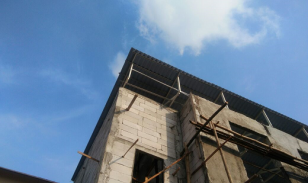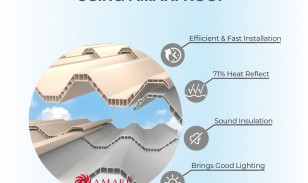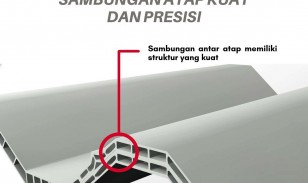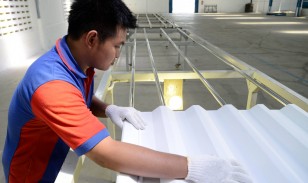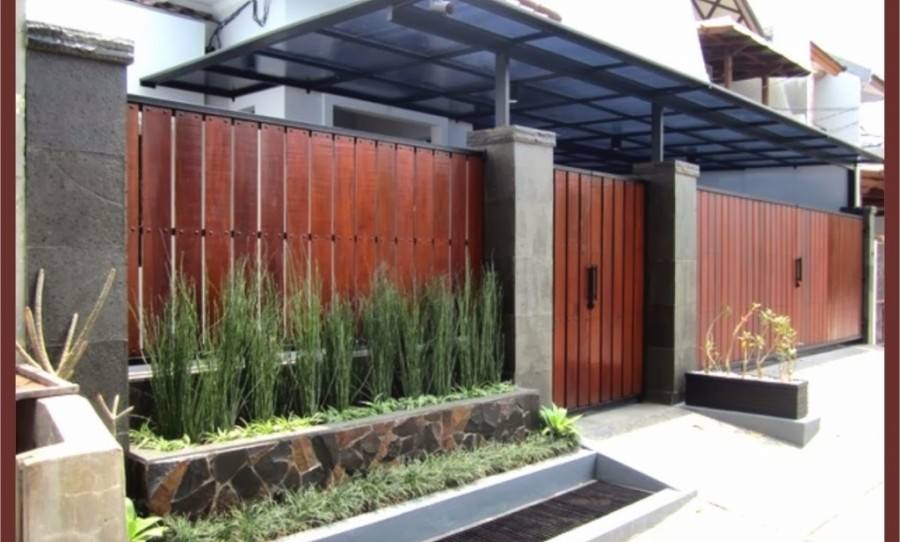
The types of canopy roofs are currently increasingly diverse and innovative. The existence of a canopy roof is very important to protect your property from the scorching sun, rain, humidity and increasingly erratic weather conditions. In addition, in terms of design and appearance, a canopy roof can increase the aesthetic value of a building.
If you are planning to install canopy roofs for factories (including chemical and processing factories), sports stadiums, agribusiness, fisheries, agriculture, livestock, plantations, warehouses, malls, supermarkets, shops, housing and so on, here are some types of canopy roofs that you can use: Can be used for all types of buildings:
1. Zincalum or Spandek roof

The spandek roof is a roof made of metal, which is a combination of 55% aluminum, 43% zinc and to increase the level of flexibility, 2% silicon material is usually added to make it easier to shape. From these metal materials then a galvanization process is carried out to prevent rust.
The spandek roof has advantages, among others, the durability of the spandex roof is claimed to be able to last up to 20 years or more, and has a thickness that can be adjusted to your building from 0.3 mm to 0.5 mm, so that the appearance of the spandex roof is more pleasing to the eye, it can be re-coated with paint of your choice.
The drawback of this spandek roof is that it is very noisy when it rains.
2. Polycarbonate Roof
As the name implies, this polycarbonate roof is made of "Polycarbonate" material. In the form of a plastic sheet with a cavity that serves to absorb sunlight. Polycarbonate is very flexible and can be used anywhere. Besides being used as a canopy material, polycarbonate can also be applied to green houses, partitions, roofing materials, skylights, gazebos, bus shelters etc.
Polycarbonate roofs have several advantages, including being able to reduce solar heat, printed in sheet form making it easier to install, flexible and durable for up to 10 years, modern appearance and suitable for today's minimalist homes.
Disadvantages of polycarbonate roofs, among others, are only suitable if the canopy is small, for wide sizes it usually doesn't last long and is easily porous, the price is quite expensive and difficult to clean.
3. Roof Onduline

With distinctive characteristics, strong and economical, onduline roofs are the choice of many consumers for canopy installation. In addition to being able to absorb heat and muffle sound well, onduline roofs have several advantages, among others, having resistance to strong winds and rain, light weight making it easier to transport and install, strong and able to withstand evenly distributed loads of up to 0.9 Ton/m2, and are durable against environmental factors. unpredictable weather.
4. Glass Roof

The glass roof has an elegant aesthetic and luxury value for those who are anti-mainstream to the canopy roof design of your building, besides that the glass roof can provide sufficient natural light for today's healthy room designs, so that it is not easily broken, it can be installed in duplicate in combination with the frame. Galvalume so that it has a strong support and a strong roof. But you have to be prepared to dig deeper into your pocket because the price is quite expensive.
5. UPVC Roof

UPVC roof is currently a trend as well as the best choice for your building canopy. With a smart design, the upvc roof has excellent performance with various advantages, AMARI UPVC is one of the best choices for a quality canopy roof for your building. made of Unplasticized Poly Vinyl Chloride (UPVC) which is a derivative of plastic and has undergone a certain process to eliminate the flexural properties of the plastic, resulting in a hard, strong and rigid plastic that is very good for use as a canopy roof. What will you get if you use this Amari UPVC canopy roof:
- Cooler temperatures without insulation, ASA layer material reflects 71% of the sun's heat;
- Has an intelligent air cavity design capable of reducing sound and noise very well, Not noisy especially when it rains;
- Contains materials that absolutely will not suffer from corrosion or rust problems;
- very suitable for use in countries with tropical climates with high humidity and rain intensity and is resistant to all types of weather;
- Able to last very long against Acid, Alkali, Salt and Industrial Emissions;
- Environmentally friendly and recyclable materials;
- Has a weight of 3 times lighter than fiber roofs or other roof panels made of metal and composites, but still able to withstand very large loads;
- Class B1 Fire Resistant Products, safety is at the highest point;
- Resistant to Sun's UV Rays;
- Does not transmit fire and electricity;
- No extravagant framework;
- Very easy to install;
- 10 Years Warranty.
Amari UPVC Can be applied in various types of buildings as follows:
- Roofs for factories (including chemical and processing plants);
- Sports stadium;
- Agribusiness industry (fishery, agriculture, animal husbandry and plantation);
- Warehouse;
- Commercial buildings (malls, supermarkets, shops, supermarkets);
- Multipurpose building;
- Parking lots;
- Housing;
- Etc.
Well, with this information, hopefully you can determine the best type of canopy roof for your building needs.

